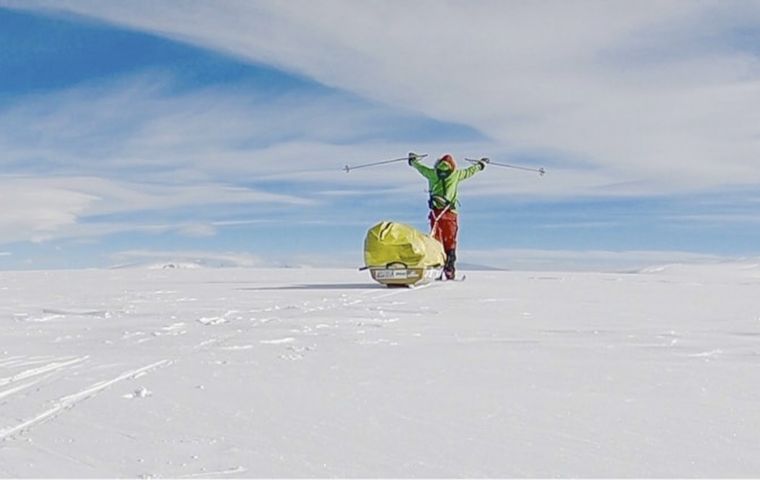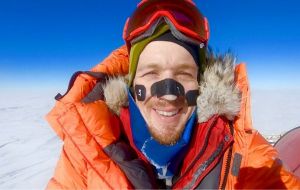MercoPress. South Atlantic News Agency
US citizen becomes first person to cross Antarctica alone and unassisted
 Explorer Colin O'Brady finished in 53 days, ahead of British Army Captain Louis Rudd, 49, after an epic race across the ice. Both men set out on 3 November
Explorer Colin O'Brady finished in 53 days, ahead of British Army Captain Louis Rudd, 49, after an epic race across the ice. Both men set out on 3 November  “I'm tired, man. I'm exhausted, but I'm making steady progress every day,” said O'Brady from his satellite phone on 20 December - Day 47 - as he camped
“I'm tired, man. I'm exhausted, but I'm making steady progress every day,” said O'Brady from his satellite phone on 20 December - Day 47 - as he camped A 33-year-old American man has become the first person to cross Antarctica alone and unassisted. Explorer Colin O'Brady finished in 53 days, ahead of British Army Captain Louis Rudd, 49, after an epic race across the ice. Both men set out on 3 November to complete the journey, which killed a British ex-Army officer two years ago.
The 1,482km trek took them across the coldest continent on Earth in some of the most extreme conditions. O'Brady, a pro-athlete who posts his milestones on social media, spoke to the BBC on one his harshest days.
“I'm tired, man. I'm exhausted, but I'm making steady progress every day,” he said from his satellite phone on 20 December - Day 47 - as he camped amid a storm and massive ridges of ice and snow known as sastrugi.
After a day which was like being “in the inside of a ping-pong ball” O'Brady said he was grateful to have negotiated the wavelike ridges of hard snow and ice in low visibility without having broken a leg.
“I've been dragging an almost 170kg sled for 12-13 hours per day through the coldest harshest place in the world,” he said, adding that he had lost so much weight that his wristwatch had been slipping off and he is “scared” to look at his unclothed body.
The two men set off from the Ronne Ice Shelf after poor weather delayed their start for several days. Only days earlier they had met for the first time at a hotel bar in Chile and agreed to turn their separate attempts to cross solo and unaided into a formal competition.
Both men come from very different backgrounds. In 2008 O'Brady suffered severe burns to 25% of his body during a holiday in Thailand, leading doctors to tell him that he may never walk normally again.
He recovered and went on to race in triathlons before climbing each of the Seven Summits - the highest peaks on every continent. He has also skied to both the north and south pole and hiked to the highest point in every US state.
Throughout it all, he has posted words of inspiration on Instagram, and used his satellite phone to take a question each night from one of the thousands of students who have followed his solo expedition.
Rudd, a father of three, was given leave from the military where he has spent his career, in order to train and attempt to make the crossing.
He was inspired to attempt the adventure after the death of his friend and colleague, Henry Worsely, along the same route.
Worsely died of an illness after he was rescued only 30 miles from the finish line - the Ross Ice Shelf.
In his daily dispatch from the ice on Christmas Eve, Rudd described carrying Worsely's flag to the places that his friend had come so close to reaching.
“I'm carrying Henry's flag... that he carried on all his journeys, and it's really important to me that, this time, the flag goes all the way, and completes the journey right to the end,” he said, before completing his posts as he always does.
Antarctica is well-known as the coldest continent on Earth, but it is also the highest and driest. The cold freezes all moisture, technically making the landscape a desert.
Mile-thick sheets of ice covering the continent also make it the highest average-elevation landmass with a peak that the men reach of 9,613ft.
Sunlight, which shines 24 hours a day in the summer, O'Brady says, “is weird and disorienting but I actually kinda like it,” since it allows him to charge his solar panels.
The men must carry all the calories they will consume throughout the journey, a nearly impossible task considering their level of energy exertion, and boil ice and snow for all their drinking water.
Apart from occasionally spotting each other as specks on the horizon, they have seen very few forms of life.
At the South Pole, O'Brady says he saw some signs of life from the polar researchers stationed there, but was forbidden from accepting any help which would have prevented him from achieving his goal unaided.
Before bed, they each pack all their wet clothes into their sleeping bag, so they could use their body heat to dry the gear throughout the night.
But soon they will be back in their beds, looking back on their accomplishment and dreaming of the next previously-impossible goal.




Top Comments
Disclaimer & comment rulesCommenting for this story is now closed.
If you have a Facebook account, become a fan and comment on our Facebook Page!